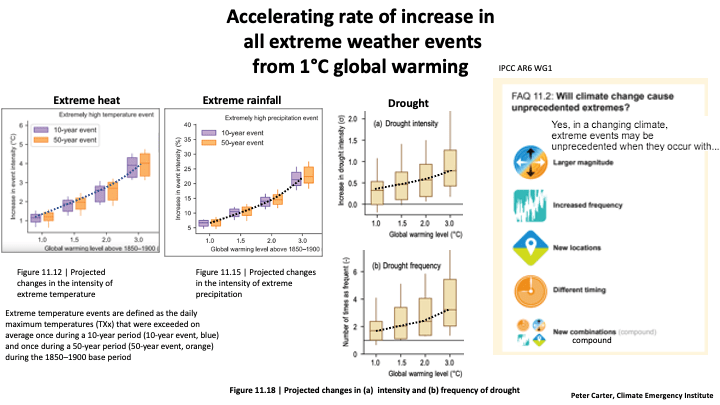The connection between extreme weather events and climate change

The relationship between climate change and extreme weather events
Extreme weather events refer to severe weather phenomena such as heatwaves, tropical cyclones, floods, droughts, and storms that occur outside the normal or expected pattern in a given location
Climate change has been one of the major global concerns in recent decades. These changes have a significant impact on various aspects of human life, including food security, public health, and the global economy.
One of the most evident consequences of climate change is the increase in frequency and intensity of extreme weather events such as floods, droughts, hurricanes, and heatwaves. In this article, we will explore the relationship between climate change and extreme weather events.
What is climate change?
Climate change refers to a set of significant alterations in global climatic conditions. These changes are primarily caused by the emission of greenhouse gases into the atmosphere, resulting from human activities such as burning fossil fuels, intensive agriculture, and deforestation.
Climate change has caused a gradual increase in the average temperature of the Earth, which, in turn, has led to an increase in the frequency and intensity of extreme weather events.
To understand the relationship between climate change and extreme weather events, it is important first to understand how the climate works. The climate is determined by several factors, including the temperature of the sea surface, the amount of greenhouse gases in the atmosphere, and atmospheric circulation patterns. When these factors are altered, the climate also changes.
Climate change is primarily caused by the increase in greenhouse gas emissions, such as carbon dioxide (CO2), methane, and nitrous oxide. These gases trap the sun’s heat in the atmosphere, preventing it from escaping back into space and warming the Earth. As a result, the average temperature of the Earth is increasing, causing significant changes in the global climate.
What are extreme weather events?
Extreme weather events refer to severe weather phenomena such as heatwaves, tropical cyclones, floods, droughts, and storms that occur outside the normal or expected pattern in a given location. These events may be more intense, more frequent, or last longer than normal, and have the potential to cause significant economic, social, and environmental damage.
The connection between extreme weather events and climate change
Extreme weather events are a direct consequence of climate change. Global warming caused by greenhouse gas emissions from human activities increases the global average temperature and the frequency and intensity of extreme events. The Intergovernmental Panel on Climate Change (IPCC) noted that “it is extremely likely that human activities have been the dominant cause of observed warming since the mid-20th century.”
Global temperature increase, for example, contributes to more frequent and intense heatwaves. The melting of polar ice and permafrost also contributes to rising sea levels, increasing the likelihood of flooding in coastal areas. Additionally, the increase in sea surface temperature increases the frequency and intensity of tropical cyclones, which can cause significant damage to coastal communities.
Climate change also affects the frequency and intensity of extreme precipitation events. Warming air increases water holding capacity, which means that storms can be more intense and produce more rainfall than normal. This can lead to floods and landslides, which cause significant damage to communities and infrastructure.
The impacts of extreme weather events
Extreme weather events can have significant impacts on society, the economy, and the environment. Floods, for example, can damage or destroy infrastructure such as roads, bridges, and buildings, and cause loss of life and displacement of entire communities. Droughts can affect agricultural production and lead to food and drinking water shortages. The increased frequency and intensity of tropical cyclones can negatively affect fishing and tourism, which are important to the economy of many coastal countries.
What can we do to minimize the impacts of extreme weather events?
There are several measures we can take to minimize the impacts of extreme weather events. One of the main ones is to reduce greenhouse gas emissions in the atmosphere. This can be done through the adoption of renewable energy sources such as solar and wind energy, and reducing overall energy consumption.
In addition, it is important to invest in infrastructure that is resilient to extreme weather events. This includes building levees and dams to protect coastal areas and improving transportation and water supply infrastructure to minimize the impacts of droughts and floods.
It is also important for communities to prepare for extreme weather events by creating emergency and evacuation plans and educating the population.
References:
Eventos climáticos extremos aumentaram cinco vezes nos últimos 50 anos
Mudança Climática – Eventos climáticos extremos estão mais frequentes
Eventos climáticos extremos e impactos socioeconômicos
Os eventos climáticos extremos já se acumulam
Já enfrentamos a ameaça dos eventos climáticos extremos
Eventos climáticos extremos e seus principais impactos
[ Se você gostou desse artigo, deixe um comentário. Além disso, compartilhe esse post em suas redes sociais, assim você ajuda a socializar a informação socioambiental ]
in EcoDebate, ISSN 2446-9394
A manutenção da revista eletrônica EcoDebate é possível graças ao apoio técnico e hospedagem da Porto Fácil.
[CC BY-NC-SA 3.0][ O conteúdo da EcoDebate pode ser copiado, reproduzido e/ou distribuído, desde que seja dado crédito ao autor, à EcoDebate com link e, se for o caso, à fonte primária da informação ]